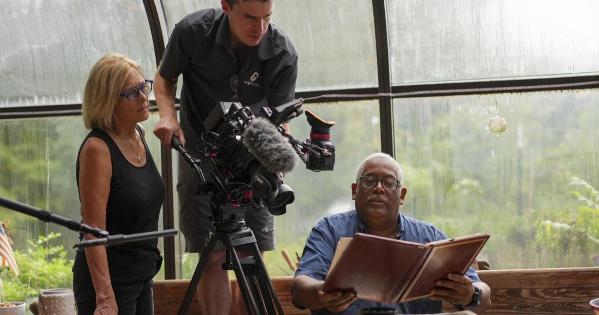Latest CEF Documentary Upstream, Downriver examines Clean Water Act

Last month, American University School of Communication (AU SOC) Professor Maggie Stogner’s latest film, Upstream, Downriver premiered at an AU symposium hosted by the School of Public Affairs’ (SPA) Center for Environmental Policy celebrating the 50th anniversary of the Clean Water Act. The film looks back at the historical milestones of the Clean Water Act, examines the current health of our waterways, and looks ahead to the challenges still facing us, notably environmental justice. It is already gaining major momentum and was shown virtually on October, 18, 2022 by the Clean Water for All Coalition which represents over 80 environmental organizations.
This is the second time Stogner, who directs SOC’s Center for Environmental Filmmaking (CEF), has used her talents to spotlight landmark environmental policies and their outcomes. In 2020, Stogner’s film, Unbreathable: The Fight for Healthy Air, premiered at the celebration of the Clean Air Act’s 50th anniversary. COVID-19’s arrival moved the event online and the film made its debut virtually. The unexpected online premiere allowed the film to immediately reach audiences across the country and around the world. It made Stogner realize how powerful online film distribution can be. Shortly after the debut of Unbreathable, she began researching a new film to coincide with the upcoming 50th anniversary of the Clean Water Act. She set to work on a plan to direct a new film exploring the topic for online distribution and maximum impact.
The theme of the film was clear: the importance, impact and current state of water in the nation. Over half of the waterways in the U.S. are still too polluted for drinking, swimming, fishing, and aquatic life. Next, Stogner started looking for partners. Stogner believes partnerships are absolutely essential in ensuring the relevancy and impact of a film, especially one that revolves around environmental justice. Stogner values regional partnerships and heavy student and alumni involvement throughout the production process. This stems from her deep belief in community-based filmmaking.
Clean water is an ongoing issue, so it requires ongoing advocacy, says Stogner. She partnered again with AU’s Center for Environmental Policy and together, they formed alliances with nonprofit advocacy organizations like American Rivers, Clean Water for All Consortium, Waterkeeper Alliance, and others. These relationships are key for distribution and audience accessibility, but the relationship doesn’t stop there. Collaborating with those who already have a community helps provide media tools that are catalysts for engagement and action. These organizations are already making an impact regionally and know how to reach their audiences.
Alongside regional partners, the film was produced with support from AU, SPA, CEP, CEF, and the College of Arts and Sciences (CAS). Stogner spoke of how essential it is to have the support of AU and the Deans to advance the work of faculty and students.
Stogner views her position as director as one of mentorship. One of her goals for this film was to get as many AU SOC students and alumni involved as possible. Current SOC students filled positions as web designers and cinematographers, but Stogner found a unique avenue to engage alumni on Upstream, Downriver. As an environmental justice project, the carbon footprint of the film was a central concern to Stogner and others. In order to lessen the environmental impact, Stogner reached out to AU SOC alumni who were living in the different regions where she needed to film. From Los Angeles to Alabama to Mexico, SOC alums such as Amelia Tyson, Stephen Tringali, and Fernando Rocha helped with the film shoots. Additionally, SOC graduate students Marissa Woods and Alvan Obichie assisted on Upstream, Downriver, as did CAS professor Matt Twiford and his students. Stogner said, "One of the most gratifying aspects of working with alumni is seeing how much they’ve grown professionally after graduating from our environmental filmmaking program." She was pleased to see her commitment to mentorship come full circle as alumni stepped in during filming to mentor current students.
When asked to reflect on the process of making this film, she smiled, "the journey is the reward, and this has been a really good journey." Her hope is that this film spurs viewers to action. As water scarcity and contamination issues dominate the news cycle, Stogner says, "so much doom and gloom can be very disempowering. Upstream, Downriver showcases inspiring stories of people and communities taking action to fight for clean, healthy water."